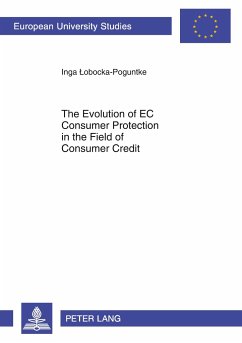Using consumer credit regulation as a case study, this book investigates how the specific legislation in this field can be explained by the major streams of economic philosophy. Based on an analysis of the evolution of European consumer credit legislation it is shown how the EU legislator's approach towards consumer protection has changed. The author discusses how the role of contemporary consumers is conceptualized by European legislators. It can be shown that EU consumer credit regulations are a perfect example for illustrating the wider changes in EU consumer legislation. The core argument of this book is that for all consumer credit aspects there is a common focal point in that there is tension between two fundamental goals of the European Community, namely economic efficiency (understood as a competitive market society) and consumer protection (understood as a social justice society with its distributive role).








